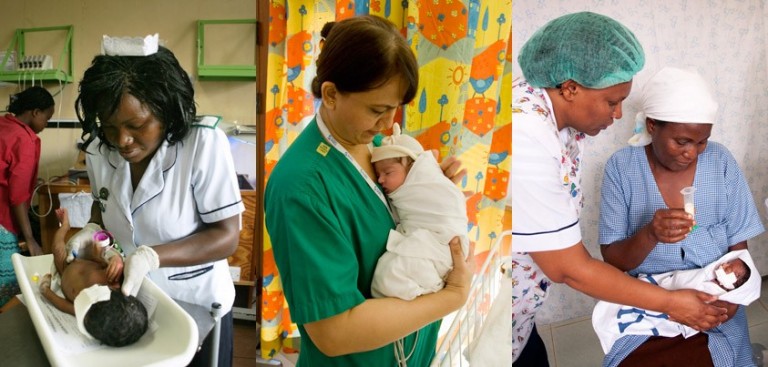In 2013, I had the privilege of honoring three nurses with the International Neonatal Nursing Excellence Award at the 8th International Neonatal Nursing Conference. These nurses demonstrated heroic commitment to saving newborns and supporting families despite enormous challenges.
Christine Sammy, senior nursing officer in rural Kenya, leads a neonatal intensive care unit at a district hospital, training other nurses in newborn resuscitation and the management of newborn conditions. Evidence-based practices form the foundation of Nurse Anila Ali Bardai’s work; she leads the Aga Khan University Hospital’s NICU in Karachi, Pakistan, where she teaches new staff and nursing students how to manage nursing services across the continuum of care. Runner-up for the award, Netasyi Gowero, is a young nurse midwife at Queen Elizabeth Central Hospital in Blantyre, Malawi; she works tirelessly to monitor and ensure that sick newborns are properly fed, medicated, and receive and kept warm.
Since 2013, much has changed in the global landscape for newborn health, most notably the endorsement of the Every Newborn Action Plan by 194 countries at the World Health Assembly 2014 as well as inclusion a newborn mortality target in the Sustainable Development Goals and the Global Strategy for Women’s, Children’s and Adolescents’ Health. These global platforms have elevated core issues that need to be addressed if we are to achieve ending preventable neonatal mortality including the need for trained, equipped, motivated frontline health workers.
But many challenges remain, including in the nursing profession. There is an acute shortage of neonatal nurses in middle-and low-income countries, which means we can’t always provide needed care in the settings where 98 percent of global annual neonatal deaths occur. Qualifying to become a neonatal nurse in these countries is difficult, since all training programs are located in high-income countries, and certification programs are rare. Without certification, nurses who are already providing neonatal care in these settings may be rotated to other departments, leaving an acute staffing shortage in neonatal wards. The cadre of neonatal nurses in low- and middle-income countries needs to be developed, strengthened, and supported.

Despite these challenges, neonatal nurses continue to inspire us through their dedication to applying evidence-based practices to ensure that babies are born safely, properly cared for, and that families are supported every step of the way. We want to recognize these efforts in calling for nominations for the International Neonatal Nursing Excellence Award 2016.
The International Neonatal Nursing Excellence Awards seek to honor nurses who work tirelessly, and often underappreciated, in low-resource settings providing newborns with the best chance at life. Recognizing the important role they play can help to inspire others to take on this valuable work that has real impact. Please submit a nomination of a nurse with demonstrated commitment and passion for neonatal care by March 31, 2016
